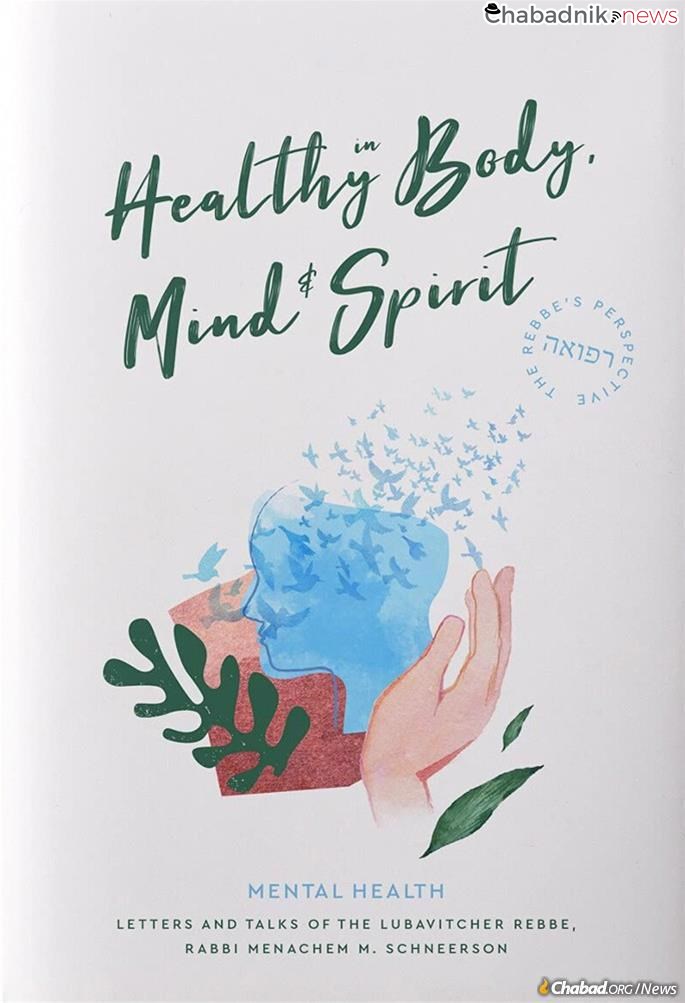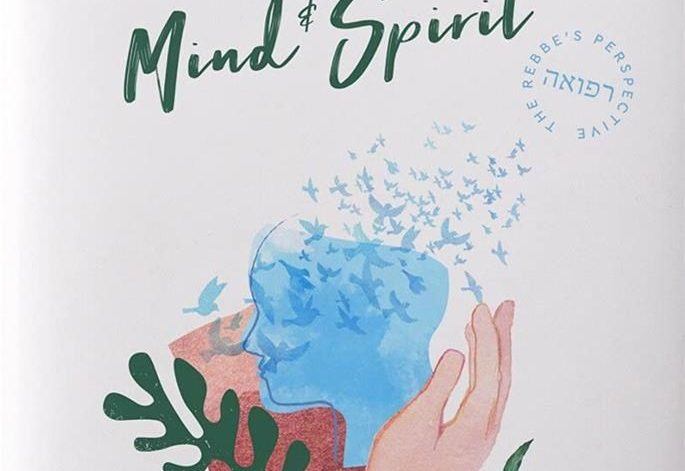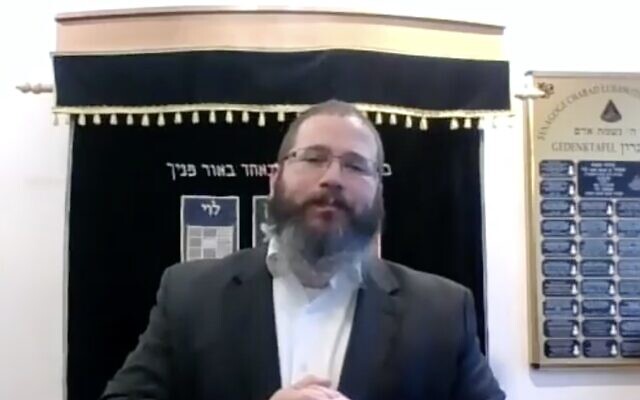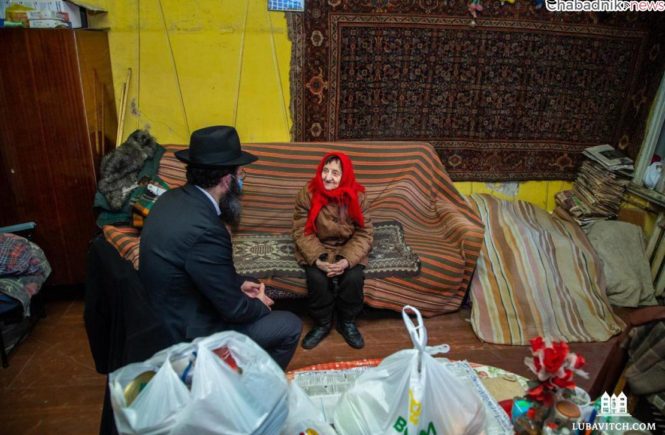A classic work from Sichos in English receives expanded and updated text, and a new design

As the world continues to reel from attacks on Israel, the tragedy in Meron and recovery from the coronavirus pandemic, a new and expanded version of a truly timely volume is seeing the light of day this spring. Healthy in Body, Mind, and Spirit—a collection of letters and talks of the Rebbe—Rabbi Menachem M. Schneerson, of righteous memory—on physical, mental, emotional and spiritual health, and their integrated impact on well-being, especially during challenging times, has been updated and republished by Sichos in English
While the book has been in print for some years now as part of a three-volume set, the events of a year marked by the coronavirus pandemic, and all the grief and uncertainty it has brought, created a more immediate need for such content. So the editors at Sichos in English set themselves the task of digging into the archives of the Rebbe’s teachings to find even more material, and then redesigning the book to make it more attractive and easier to read, overall producing a volume with more contemporary impact.
The first edition of Healthy in Body, Mind, and Spirit was compiled and translated by Rabbi Sholom Ber Wineberg, who also translated the additional letters included in this new volume. For the revised edition, a team of researchers added additional sources from the Rebbe’s letters.
An essential element of the Rebbe’s approach to mental health articulated throughout the volume is the importance of a belief in a loving G‑d and the efficacy of religious practice in the prevention and treatment of physical, emotional and mental disorders.
Another focus that pervades Healthy in Body, Mind, and Spirit is on a G‑d-centered, moral education in preventing many societal, psychological or physical challenges at the earliest stages of life.
Often noting that Torah is a true guide for life—“the Torah of truth, the Torah of life”—the Rebbe pleaded with parents, educators and legislators toraise children with a clear sense of G‑d’s presence and involvement in their lives, and His unlimited love for them. Children, he said, need to be empowered with the understanding that they contain a spark of G‑d within themselves, and therefore possess the ability to overcome obstacles in their path and fulfill their Divine purpose.
“When I read the Rebbe’s letters to people on this topic, I’m struck with how much the Rebbe believed in the person he was talking to,” said Rabbi Yanky Raskin, LMSW, a local rabbi and school therapist in the Crown Heights neighborhood of Brooklyn, N.Y. “You can see how much the Rebbe had a deep-seated respect for his addressees, talking to them with the rapport of a trusted friend who really knows and believes that you can be the best version of yourself.
“So while to some, it may seem that at times the Rebbe sets the bar very high and demands quite a bit, it’s really a reflection of how much the Rebbe insisted that one is never a victim of their circumstances and truly possesses the inner fortitude to realize their greatest potential. Of course, it may be a process to get there, and perhaps one will need to marshal additional resources to climb up to that bar, but in the Rebbe’s view, it is eminently possible.”

Addressing a Need
Rabbi Shmuel Avtzon, director of Sichos in English, explained the process of how this project came to be. “Back in the beginning days of this crazy pandemic, around Passover time of last year, everyone was in lockdown and there was a terrifying wave of deaths gripping the community. People were really scared and downright depressed, and we wanted to do something to strengthen people, to lift them up.
“We started sending out a daily inspirational message from the Rebbe about faith, joy and courage in the face of adversity from the original print of the book over WhatsApp and other social-media platforms. The messages were enthusiastically received; we saw how much people really need this during these times,” he said.
After a few months of this process, it became clear that it would be best to simply let people know about the book and promote it more widely. When the publishers took a better look at it, they realized that it would be wise to update it and expand it.
“When the volume was originally published, mental-health awareness wasn’t anything close to what it is today, and it really only came in the context of a broader, three-volume set. Where we are now, we felt it appropriate to revisit the work and add more context and update it for a broader audience,” said Avtzon.
A Look at the Book
Indeed, a cursory look reveals a wealth of information that can provide much insight into trying times. After all, over the many years of his leadership, the Rebbe received a copious amount of letters and other correspondences, and among the many and varied issues the Rebbe addressed, matters of mental and emotional health rank prominently. Hence, the veritable mountain of responses and statements on the topic—through direct correspondence, answers relayed via his secretariat, private audiences and via public pronouncements at the Chassidic gatherings known as farbrengens.
As the Rebbe always did, much of the instruction and guidance flows from the words of Torah, bringing to the reader Judaism’s refreshing and holy direction for life. As the book notes in its foreword, the Rebbe would often quote the words of the Maggid of Mezritch that “a small hole (ailment) in the body, is a big hole in the soul,” demonstrating the idea that physical and spiritual health are two sides of the same coin and what impacts the spirit impacts the body—certainly, the mind and heart.
The Rebbe’s approach to health and healing is holistic, advising each person and ailment according to its unique physical, mental and spiritual dimensions.
When reading the many responses, it becomes clear how the Rebbe synthesized the physical, psychological and spiritual aspects of healing. While some issues could be addressed from a spiritual /educational perspective, others ought to be handled with professional medical intervention, especially in order to cure existing mental conditions. The spiritual aspect was not intended to serve as a substitute for the medical treatment; it worked beside it and complemented it.
How to Read the Responses
An important item to understand while reading the book is that much of the material was assembled from private responses to individuals. The Rebbe addressed each person in the context of their lives, their values, their emotional state and their struggles. So while an answer to one Chassid whose background, life’s experiences and internal values may assume a slightly harsher, more candid tone, another correspondence can be entirely soft and compassionate. Of course, there is a broad spectrum in both content and tone, tailored to each individual.
As the Rebbe once wrote himself, “It is patently obvious that a directive to an individual does not serve at all as a directive to the public, even when the issues are the same.”
“We were well aware of this challenge when compiling the information,” said Avtzon. “We did the best we could to include a wide spectrum of responses, as well as pairing a number of communications with a consistent tone to get a real idea of the Rebbe’s overall approach. “It’s also important to bear in mind the context of the time period in which something was stated, particularly vis à vis accepted medical opinions of the time.”
Bearing this in mind, the editors urge readers in the forward: “In light of all the above, and in keeping with the Rebbe’s deeply-held request for every individual to seek the guidance of a personal mentor in spiritual matters, the reader is encouraged to explore—together with a mentor well versed in the Rebbe’s teachings—how the ideas expressed throughout this book might apply to their own life.”




